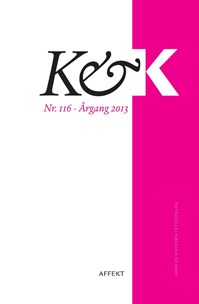STRINDBERGS VREDE STEMME
DOI:
https://doi.org/10.7146/kok.v41i116.15894Nøgleord:
voice, tone, anger, August Strindberg, Sianne NgaiResumé
STRINDBERG’S ANGRY VOICE | The article argues that the affect or emotion of a literary text could be regarded as a dimension of its voice and tone. ”Voice” is found on the level of the narrator, ”tone” on the level of the implied author. In cinematic metaphors the article proposes ”voice” to be analogous with the voice-over in film, and ”tone” to be analogous with the background music. The article develops its concept of textual voice from Horace Engdahl, and its concepts of affect, emotion and tone from Sianne Ngai. The literary text to be analysed is August Strindberg’s Le Plaidoyer d’un fou that is known as one of the texts in which he voices his monomaniac misogynist anger. The article tries to describe the quality of this angry voice through analysing structures of narration, genre, address, and style, discovering feverish volatility and paranoia to be its characteristics. The feverish volatility is shown to be linked to the shifting images of Woman that the text exposes. The paranoia is understood through Sianne Ngai’s definition of paranoia as an ”ugly feeling”, and jealous paranoia as connoting femininity. Thus the voice and tone of Strindberg’s text are discovered to be much more complex than simple misogynist aggression.Downloads
Citation/Eksport
Rösing, L. M. (2013). STRINDBERGS VREDE STEMME. K&K - Kultur Og Klasse, 41(116), 121–134. https://doi.org/10.7146/kok.v41i116.15894
Nummer
Sektion
Artikler
Licens
Tidsskriftet følger dansk ophavsret.





